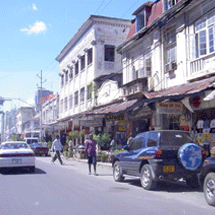
|
|
Mayors and city managers from cities including Dar es Salaam, Tanzania (pictured above), Dakar, Senegal; Ahmedabad, India; Marikina, Philippines; and Da Nang, Vietnam participated in the first Innovative Cities Dialogue. Photo courtesy Tanzania Tourist Board
|
[12 July 2010] -- Until the early 1990s, Marikina, Philippines, was a poor municipality in metropolitan Manila. Unemployment was high, and theft, murder, and rape were rampant—an era Mayor Maria Lourdes Carlos Fernando describes with dismay.
“Our 220-hectare river used to be a haven for squatter colonies that conveniently served as a giant garbage receptacle,” she recalls.
Now, discipline, order, and first-rate leadership have turned the city into a national success story. With a vision of making a town with only one paved road into a "little Singapore," Marikina’s leaders set out to clean the rivers, eliminate graffiti, and build thoroughfares and waterfront parks where families could gather and feel secure.
Targeting "two jobs per family,” the government established livelihood training and productivity centres to upgrade citizens' skills. The city, known for shoe manufacturing, recently moved up the global value chain by offering technology training to its workers and opening call centers. More than 15,000 new businesses have sprung up.
Urban models like Marikina can serve as a learning platform for mayors and city managers struggling with issues such as congestion, rural-to-urban migration and environmental sustainability — the idea behind the new Innovative Cities Global Dialogues series, launched last month by the World Bank Institute (WBI) and the Bank’s Urban Development and Local Government unit.
The series, which provides a forum for sharing innovations and lessons in urban governance, comes as cities are increasingly seen as engines of growth.“We are both seeking to build the leadership skills of mayors and strengthen technical skills to enrich capacities of those in the frontlines of city management,” said WBI’s Vice President, Sanjay Pradhan.
Making Cities More Competitive
At the series’ kickoff conference, mayors and managers from cities including Ahmedabad, India; Dar es Salaam, Tanzania; and Seattle, Washington, described how they have made their cities more competitive and appealing to business, and have drawn a better-skilled workforce as a result.
Many emphasised that urbanisation is no longer a byword for blight; it can provide jobs, poverty reduction, and a better quality of life.
“The dialogues aim to highlight the challenges, opportunities, and important achievements in urban management,” says Keshav Varma, WBI’s Urban Practice Manager. “We plan to harvest and compile these lessons for use in learning curricula and future knowledge exchange.”
For the first time in history, more than half of the world’s population lives in cities, a group that is expected to grow by nearly 2 billion in the next 20 years. Between 70 and 75 per cent of city dwellers in Africa and South Asia are poor; in Latin America, more than half of the poor live in urban areas.Conversely, most wealth is created in cities, which account for some 70 per cent of global GDP.
No advanced country has achieved its levels of development without urbanising. U.S. Secretary of Housing and Urban Development Shaun Donovan, who spoke at the conference, noted that the United States is investing in urban growth, “building back its cities stronger and smarter.” He said metropolitan areas should be seen as “hotbeds of innovation, and laboratories for change.”
Investing in Urban Poor
A liveable city that offers a good quality of life and first-rate services such as efficient transport, education, and job opportunities will draw both businesses and a pool of skilled labor, conference participants agreed. Business will locate in urban areas where operating costs are low and where they can be connected to suppliers and international markets.
Cities also need to cultivate consumers, including the poor. Pointing to the urban poor as a potential source of innovation and creativity, Inger Andersen, Vice President, of the World Bank’s Sustainable Development group, noted that investing in basic services for the poor and low-income housing can yield high dividends, and that enormous opportunities exist to create incentives for the poor to express their entrepreneurship and energy.
Several mayors noted that visionary leadership is key to successful city management but, to ensure continuity and predictable delivery of services and infrastructure, leadership needs to be translated into professional management. “You can learn ideas, but leadership is critical to fitting the ideas to a particular place,” said Mayor Fernando, of Marikina.
“At the core of economic and social reforms, you have leadership,” agreed Bruno Laporte, Director, Thematic Knowledge and Learning, WBI. “I don’t mean the leadership that is embodied in one person, but the idea of distributed leadership, where you have stakeholders that are empowered in different sectors, whether in the government or private sector or civil society. If you don’t pay attention to this aspect, you are nowhere in terms of reforms.”
This item was published on the World Bank Institute website 12 July 2010. The first Innovative Cities dialogue was held in Washington, DC 22-23 June 2010.




